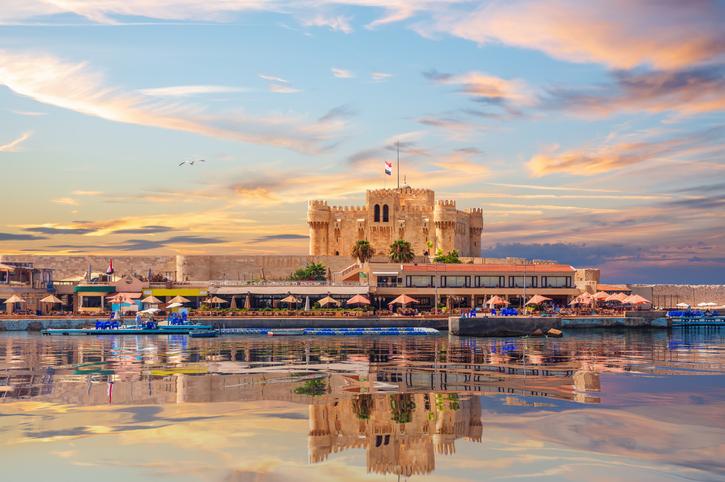
Nestled along the Mediterranean coast, Alexandria is a city steeped in history and culture. Founded by Alexander the Great in 331 BC, Alexandria quickly grew into a hub of knowledge and trade. Its strategic location made it a melting pot of cultures, influencing its development and rich heritage.
Alexandria, once home to the legendary Great Library and the Lighthouse, one of the Seven Wonders, was a hub of ancient knowledge and maritime power. Though the originals are gone, their legacy lives on. Today, the city blends rich history with modern charm, inviting visitors to explore its past while enjoying its vibrant present.
Alexandria, located in northern Egypt along the Mediterranean Sea, is the country's second-largest city and a key port with cultural importance. Its coastal setting enhances both its economic value and visual appeal. About 220 km from Cairo, it’s easily reached by train, bus, or car. The city’s Mediterranean climate makes spring and autumn ideal times to visit. Whether arriving by land or sea, travelers are welcomed by scenic views and a rich blend of history and modern life.
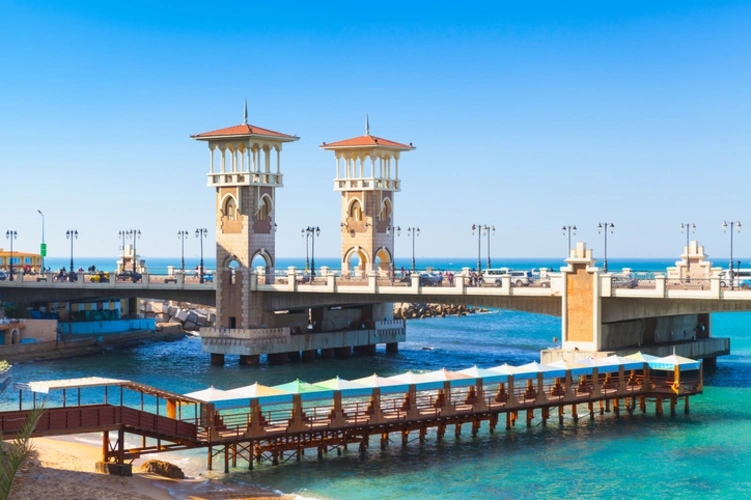
Alexandria's history is preserved in its numerous museums and landmarks, each telling a unique story of the city's past. The Bibliotheca Alexandrina, a modern tribute to the ancient library, serves as both a cultural center and a repository of knowledge. Visitors can explore its vast collection of books and exhibitions, delving into the city's scholarly past.
The Alexandria National Museum offers a comprehensive overview of the city's history, from Pharaonic times through the Greco-Roman period to modern Egypt. With artifacts ranging from ancient sculptures to contemporary art, the museum provides a holistic view of Alexandria's evolution over centuries.
Another must-visit is the Catacombs of Kom El Shoqafa, an ancient necropolis that reveals the city's blend of Egyptian and Greco-Roman influences. These underground tombs, adorned with intricate carvings, offer a glimpse into the funerary practices and beliefs of ancient Alexandrians.
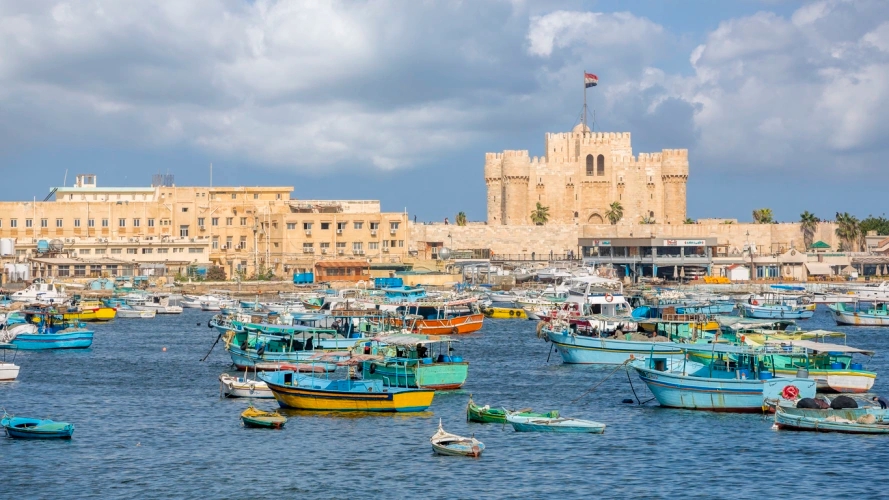
Alexandria's treasures unfold like chapters in a beloved storybook, each landmark holding secrets that transport you through centuries of cultural wonder and architectural brilliance, making it a must-see highlight on many Egypt Tours.
Feel the Mediterranean breeze carrying whispers of ancient legends as you approach this magnificent fortress perched on Alexandria's coastline. Built in 1480 by Sultan Qaitbay, this citadel rises from the very stones where the legendary Pharos Lighthouse once kissed the sky,indeed, Sultan Qaitbay cleverly wove rubble from that fallen wonder into his fortress walls. The sturdy stone chambers echo with stories of Ottoman sieges and medieval battles, while the rooftop offers breathtaking panoramas that stretch endlessly across azure Mediterranean waters. This 15th-century guardian successfully defended Alexandria against Ottoman forces until 1882. Today, visitors can wander through these time-worn halls for just 30 Egyptian pounds, with doors open daily from 9:00 am to 5:00 pm.
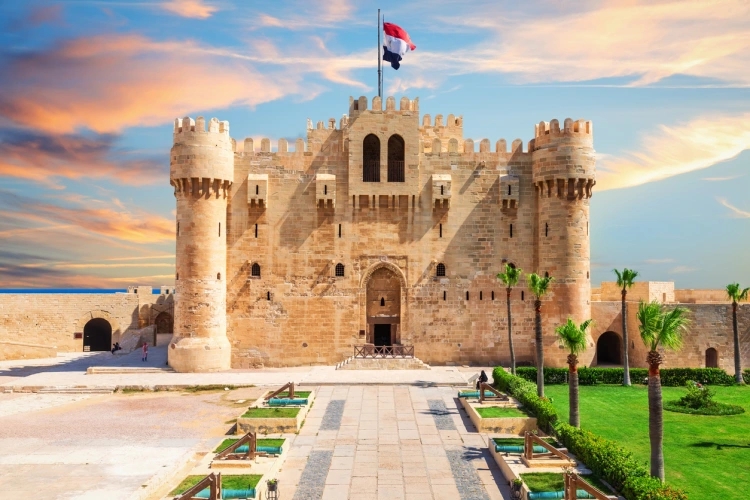
Step into this architectural marvel that resurrects the spirit of Alexandria's ancient Great Library, and you'll feel the weight of millennia-old scholarly tradition. The building itself resembles a magnificent sun disk tilted toward the Mediterranean, its glass panels catching light like scattered jewels along the Corniche waterfront. Inside, eight million volumes await curious minds, creating a cathedral of knowledge that would make ancient scholars weep with joy. Descend below the main reading hall to discover treasure troves: the Antiquities Museum showcases sculptures rescued from underwater archaeological expeditions, while the Manuscript Museum guards precious ancient texts, and families delight in the Science Museum's planetarium shows. This 20,000-square-meter temple of learning rises 32 meters high, its glass-paneled roof angled toward the sea like a scholar gazing toward distant horizons.
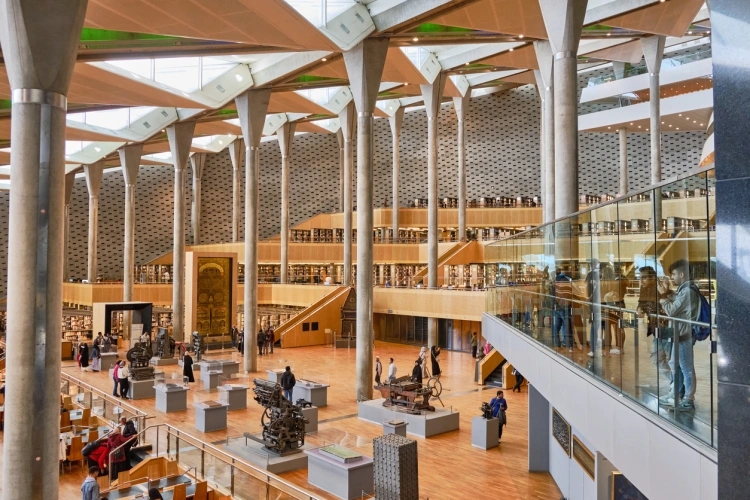
Khedive Abbas II originally dreamed this estate into existence in 1892 as his private hunting retreat, though King Fuad later expanded it into the royal family's cherished summer sanctuary. While the palace doors remain closed to visitors, the gardens themselves offer pure enchantment, a verdant paradise where worries dissolve beneath towering palms and perfectly manicured lawns. Stroll pathways lined with blooming flowers, breathe in the scented air, and discover a private beach where a charming bridge leads to a small island retreat. The palace architecture delights the eye with ornate Florentine towers and elaborate Rococo details that speak of royal elegance.
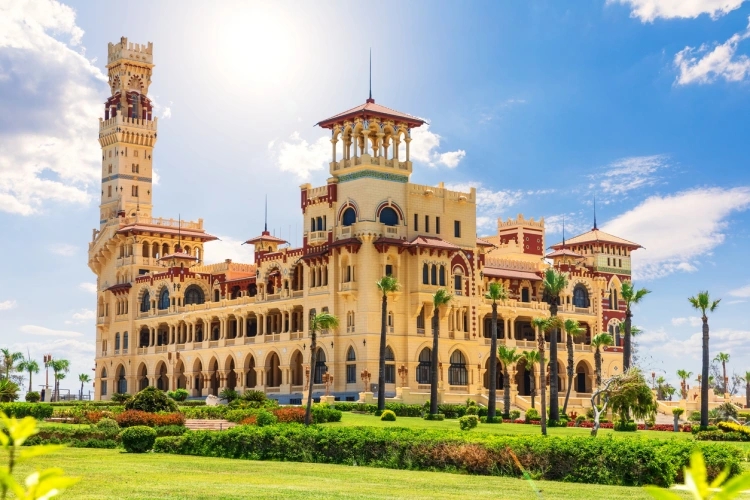
Sometimes history reveals itself when we least expect it, this remarkable theater emerged in 1960 when construction workers accidentally broke through to chambers that had slumbered for centuries. Located at Kom el-Dikka ("Mound of Rubble"), this 4th-century amphitheater stands as Egypt's only surviving Roman theater. Picture ancient audiences settling into thirteen tiers of gleaming white marble seats, the space intimate enough for just 600-700 spectators to enjoy performances under Alexandria's starlit skies. Marvel at the granite columns transported from distant Aswan, trace fingers over intricate Roman mosaics, and visit the nearby "Villa of the Birds" where 3rd-century mosaics still display their colorful artistry[192].
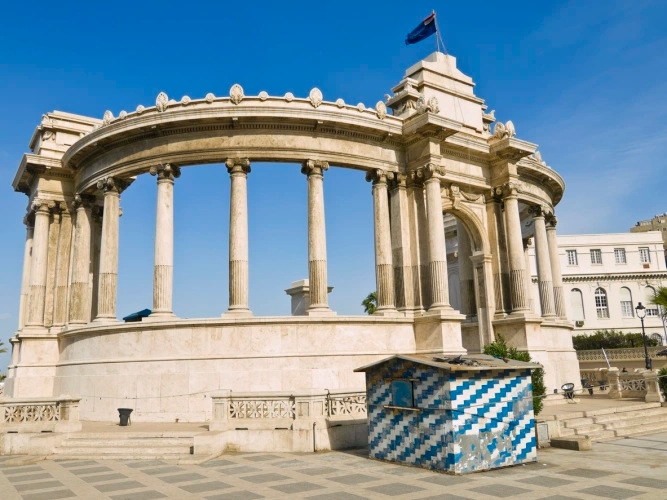
A wandering donkey changed archaeological history in 1900 when it tumbled through a shaft, revealing these extraordinary underground burial chambers. Dating from the 2nd century CE, these three-level catacombs showcase Alexandria's cultural soul, where Egyptian, Greek, and Roman traditions danced together in stone. Descend the spiral staircase carved centuries ago, and enter burial chambers where sarcophagi bloom with carved garlands and Greek deities. The most captivating sight awaits in reliefs depicting Anubis, the Egyptian god of the afterlife, dressed in Roman military regalia, a perfect symbol of Alexandria's multicultural heart beating through the ages.
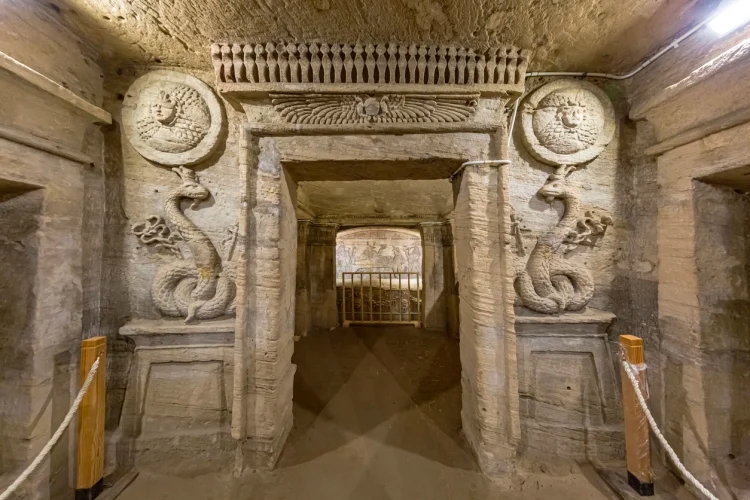
Alexandria's culinary scene is a delightful fusion of flavors, reflecting its diverse cultural influences. Seafood is a staple, with fresh catches from the Mediterranean gracing the tables of many restaurants.
Fresh Mediterranean seafood is a highlight, with restaurants like Fish Market, Sea Gull, and Balbaa Village offering delicious dishes alongside stunning harbor views.
Experience authentic Egyptian cuisine at Gad Restaurant, Abo Tarek, and El-Wahy, known for classics like koshari, ful medames, and other hearty Egyptian favorites.
Don’t miss Om Ali, a creamy, nutty Egyptian dessert often paired with mint tea. Try it at Felfela Café, Mandarine Koueider, or Trianon for the best local flavors.
From upscale waterfront venues like Delices, Balbaa El-Bahr, and Trianon, to cozy local cafés such as Coffee Corner and Rosetta, Alexandria offers a rich blend of flavors to satisfy every palate.
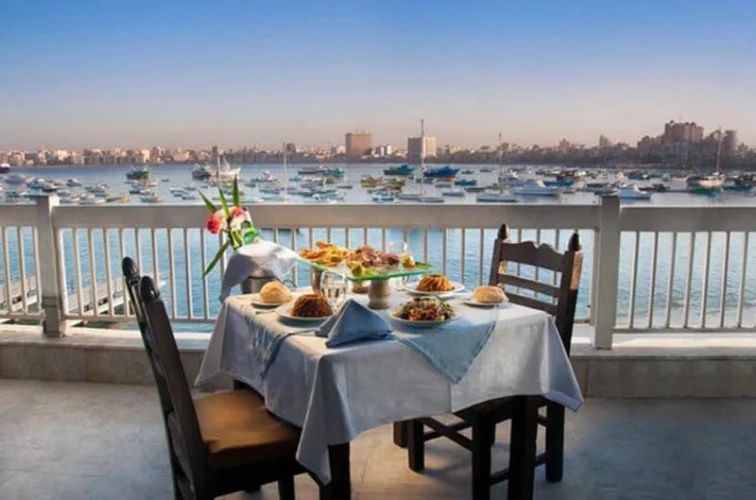
Shopping in Alexandria is a journey through culture, history, and modern style. From bustling traditional souks to sleek shopping centers, the city offers something for every taste.
1. Souk El-Attarine
A lively traditional market in the heart of Alexandria, known for its exotic spices, perfumes, and handcrafted goods. Ideal for culturally rich souvenirs and a sensory experience.
2. City Centre Alexandria
A modern mall featuring a variety of international and Egyptian brands. Perfect for those seeking fashion, electronics, and a more contemporary shopping environment.
3. Zanqat El-Setat (Women’s Alley)
One of Alexandria's oldest markets, offering everything from textiles and accessories to household items. A vibrant place to see local life and find budget-friendly treasures.
1. Handcrafted Jewelry
Elegant silver jewelry and Pharaonic-style designs capture the essence of Egypt’s ancient heritage, making them timeless souvenirs that blend cultural charm with artistic craftsmanship.
2. Pharaonic Replicas
Miniature statues, authentic papyrus art, and ancient Egypt-themed souvenirs offer a unique way to take home a piece of history, celebrating the legacy of one of the world’s greatest civilizations.
3. Colorful Textiles
Scarves, garments, and home textiles featuring traditional Egyptian patterns and expert craftsmanship make for meaningful souvenirs that reflect the country's rich cultural and artistic heritage.
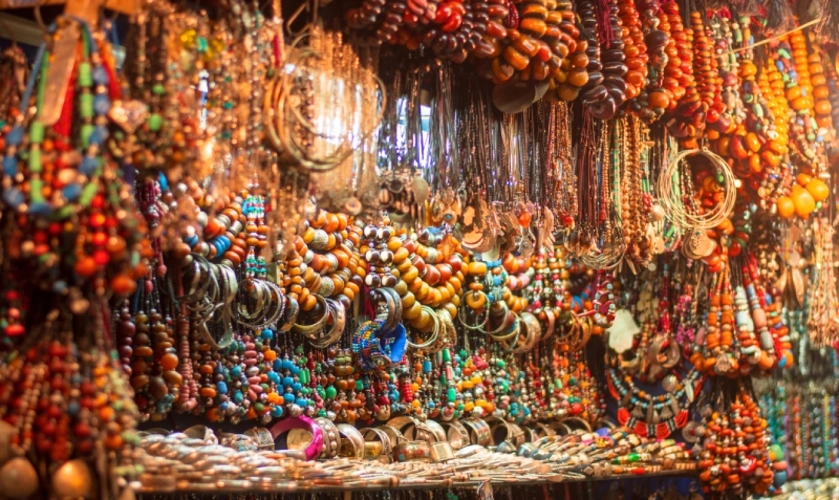
Navigating Alexandria is relatively easy, with several transportation options available. Public buses and minibusses are the most common and cost-effective means of getting around the city. While they can be crowded, they offer an authentic experience of local life.
Taxis are another convenient option, providing a more comfortable and private way to explore Alexandria. It's advisable to agree on a fare before starting your journey to ensure a fair price. Alternatively, ride-hailing apps like Uber and Careem are also available, offering a hassle-free way to travel.
For a unique experience, consider taking a tram ride. Alexandria's tram system is one of the oldest in the world, providing an affordable and scenic way to see the city. Whether you're commuting or sightseeing, the city's transportation network ensures you can easily access all the attractions.
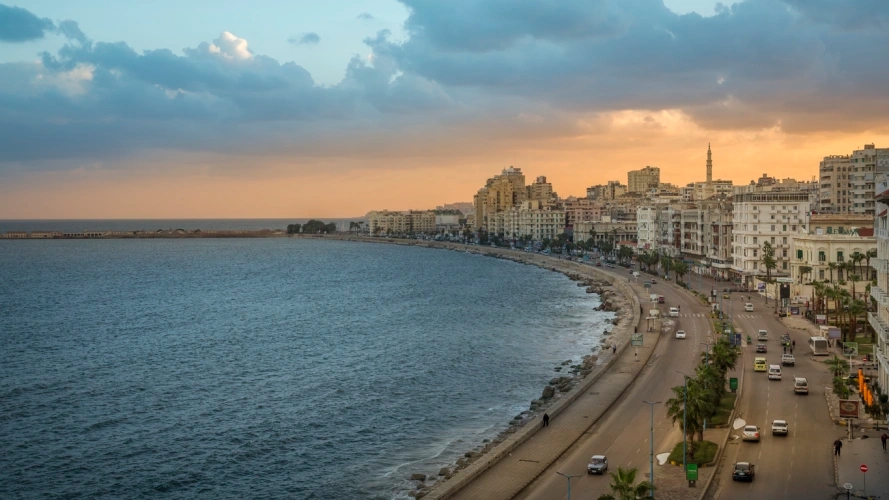
When planning a trip to Alexandria, a few tips can enhance your experience. It's advisable to book accommodation in advance, especially during peak tourist seasons. The city offers a range of options, from luxury hotels to budget-friendly hostels, catering to all preferences and budgets.
Packing light, breathable clothing is essential, particularly if you're visiting in the summer months when temperatures can soar. A hat, sunscreen, and comfortable shoes are also recommended for exploring the city's attractions.
Familiarizing yourself with basic Arabic phrases can be helpful in communicating with locals and enhancing your cultural experience. While many people speak English, a little effort in speaking the local language is always appreciated and can enrich your interactions.
The ideal time to visit Alexandria is during spring (March to May) or autumn (September to November). During these months, the weather is mild and pleasant, perfect for exploring the city's outdoor attractions. Summers can be hot and humid, while winters are cooler with occasional rain.
Alexandria hosts events year-round that reflect its vibrant culture. The Alexandria International Film Festival in October celebrates global cinema, while the Bibliotheca Alexandrina offers diverse cultural events and exhibitions. Visiting during these times lets you enjoy both the city's rich heritage and ideal weather. Whether you're into history, beaches, or food, Alexandria offers something for everyone throughout the year.
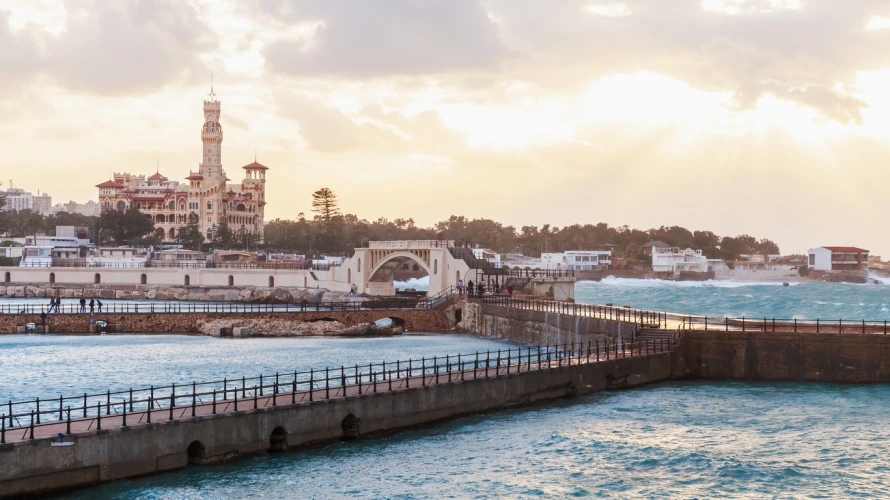
Alexandria is a city that promises a rich tapestry of historical, cultural, and modern experiences. From its ancient landmarks to its sandy beaches and bustling markets, there's something for everyone in this enchanting city. By exploring its museums, savoring its cuisine, and engaging with its vibrant culture, visitors can truly appreciate the essence of Alexandria.
To make the most of your trip, plan your itinerary with Egypt tours to enjoy a perfect blend of historical sites, relaxation, and culinary delights. Whether exploring ancient streets or watching the sunset by the sea, unforgettable memories await in Alexandria.
Q1. Where is Alexandria located?
Alexandria is in northern Egypt, along the Mediterranean Sea. It’s about 220 km northwest of Cairo and is Egypt’s second-largest city.
Q2. What is Alexandria famous for?
Alexandria is known for the ancient Great Library, the Lighthouse (one of the Seven Wonders), its Greco-Roman history, Mediterranean beaches, and vibrant culture.
Q3. What is the best time to visit Alexandria?
The ideal time to visit Alexandria is from March to June or September to November when temperatures are comfortable, ranging from 20-25°C. This period offers pleasant weather for exploring historical sites and enjoying outdoor activities.
Q4. How can I get to Alexandria from Cairo?
There are several options to reach Alexandria from Cairo. The fastest and most comfortable is by train, which takes about 2.5-3.45 hours. Buses are a more economical option, taking around 4 hours. You can also drive or take a taxi, which is the quickest land route at about 2 hours.
Q5. What are some must-try local foods in Alexandria?
Alexandria is known for its seafood, particularly the singari fish preparation. Other local specialties include the 7-cheese fondue and Kebda Eskandarani (Alexandrian liver). For a unique experience, select fresh seafood from the market and have it cooked nearby for a small fee.
Q6. What are the top attractions in Alexandria?
Key attractions in Alexandria include the Citadel of Qaitbay, Bibliotheca Alexandrina, Montaza Palace and Gardens, the Roman Amphitheater, and the Catacombs of Kom El Shoqafa. These sites offer a mix of ancient history and modern cultural significance.
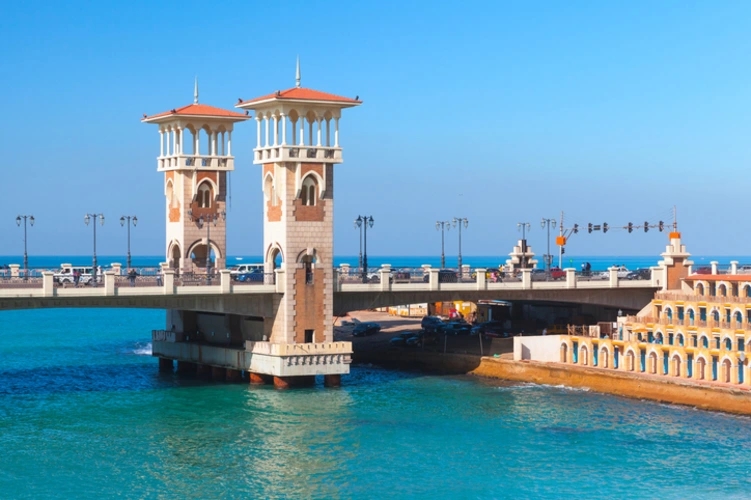

© Copyright 2025 Get Egypt Tour. All rights reserved.